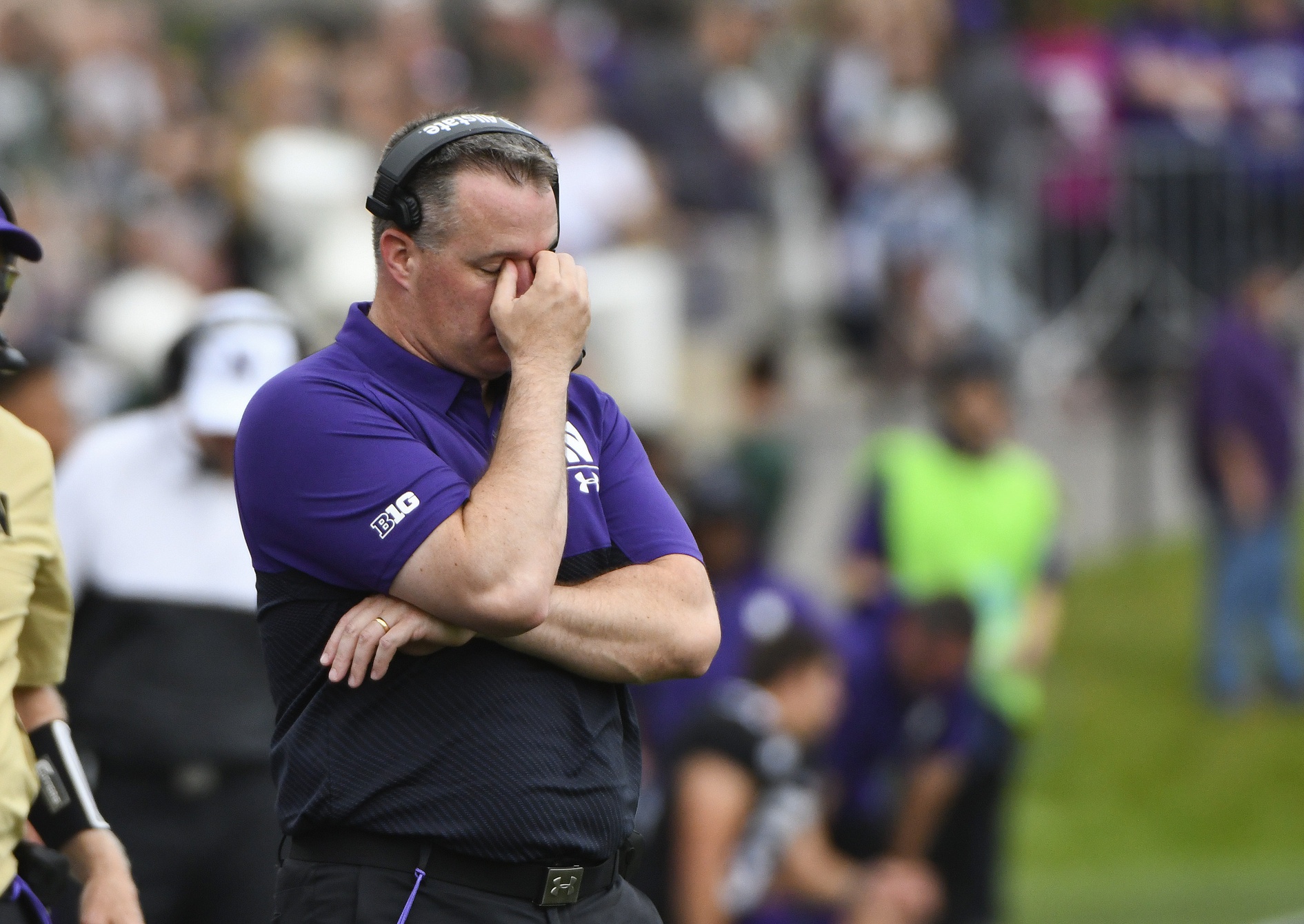Ad Disclosure

Pat Fitzgerald, his failures, and the complicated Northwestern legacy he leaves
In what seems like only a few weeks ago, I wrote an updated bio for Pat Fitzgerald. At that point, he was the head football coach at Northwestern. The winningest football coach in program history.
It began with the assertion that Fitzgerald was arguably the coach who meant the most to his respective program in all of college football. It ended with the comment, “It’s hard to envision Northwestern without Fitz.”
All of that is probably still true. But on Monday, the university “relieved” Fitzgerald of his duties as head coach after an investigation confirmed allegations of widespread hazing within the program that dated back years.
After 17 seasons, and 55 days before the start of his 18th, Fitzgerald saw the ground underneath his statue outside Ryan Field cave in.
In a letter to the Northwestern community announcing the news, Northwestern president Michael Schill said the independent investigation’s findings would remain confidential, but that “it is important for our community to know the facts.”
Defenders of Fitz tried to paint the whistleblower — who went to the school in November of 2022 to kick off the investigation and then later to The Daily Northwestern after the school decided on a 2-week unpaid suspension in July — as a rogue former player with an axe to grind.
Schill revealed that 11 current or former Northwestern Wildcats acknowledged that hazing had been happening in the program. He wrote that “this has never been about one former student-athlete and his motives,” instead that “this is much bigger than that.”
As was the case when Fitzgerald was initially suspended, Schill asserted that the investigation failed to find “any credible evidence” that Fitzgerald himself knew about what was happening in his program. In the same breath, Schill said instances of hazing were “well known by many in the program.”
The hazing that took place included forced participation, nudity, and sexualized acts of a degrading nature. Schill’s words. One former player who went on record to The Daily Northwestern said he was diagnosed with PTSD following his time in the program.
Defenders of Fitz did what defenders of every other scandalous athletic coach have done. “Couldn’t be him! We’ve known him for years! He was an upstanding man who did so much for this community!”
Northwestern has a sparkling, lakefront football facility because of Fitzgerald. Northwestern has Big Ten championship game appearances because of Fitzgerald. Northwestern has been a model football program in the Big Ten because of the way Fitzgerald-coached teams have looked on Saturdays.
He’s the greatest player to have come through the football program and he’s the most successful coach to have led it. With 110 career wins, Fitzgerald won more than the 2nd and 3rd coaches on Northwestern’s career list did combined (86).
People have the capacity for both good and bad. That tends to be lost in these situations.
A person can be good and do tremendous things. For years, we knew of only the good things Fitzgerald did for Northwestern. But people can also do bad things — or allow bad things — that require consequences.
As someone who has spoken with Fitzgerald on numerous occasions and followed his teams closely (though I won’t pretend to know him on a personal level), the outward-facing appearance was that of a respected man who did great things for his university for years and years and years and years.
But his university found enough credible evidence to verify allegations of wrongdoing. Whether he knew about it or not is irrelevant.
As the leader of the program, he’s accountable for and to the young men who hold it up. All of them.
If he knew what was happening, he failed them.
If he didn’t know what was happening, he failed them.
He’ll have to live with that, one way or the other.
And the university will eventually have to answer for why it felt it could dump the news of his suspension on a Friday only to about-face the following Monday when its own journalism students uncovered the details of the investigation.
As a private university, Northwestern isn’t beholden to the same threats of open-records requests that face public institutions. Did university leadership feel it could keep the investigation’s report private and pass on by with its suspension?
To suspend Fitzgerald on a Friday and fire him on a Monday tells the public — and the former players who came forward — the reason for the firing was not because of what the investigation found, but what the student reporters at The Daily Northwestern found. At best, it’s feckless. At worst, it’s absentee leadership.
Put a different way: It’s another failure.
With controversy now gripping the baseball program, and the stain of the Mike Polisky resignation still visible on those crisp, purple polos, Northwestern is facing a crucial moment.
For years, Fitzgerald orchestrated moments of great triumph and pride for the university.
And for years it seems he was an enabler of moments that deserve a great amount of shame.
In a moment, that became his legacy. What comes next for the university will be tremendously important. It cannot afford another failure.
Derek Peterson does a bit of everything, not unlike Taysom Hill. He has covered Oklahoma, Nebraska, the Pac-12, and now delivers CFB-wide content.